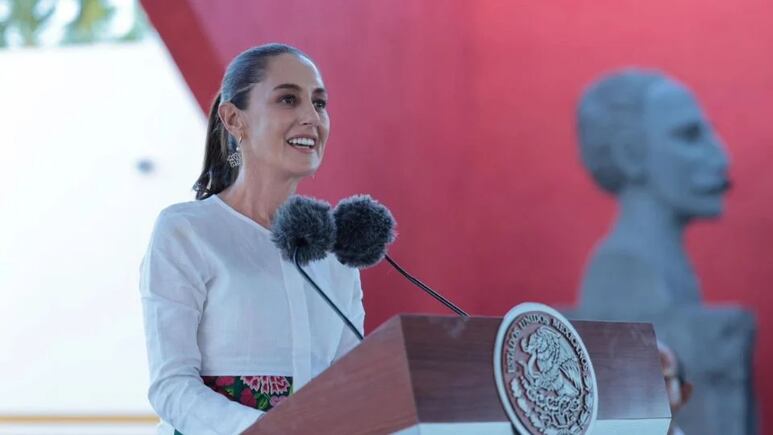A Troubled Relationship (I)
It’s not incorrect to say that both countries need each other, but neither is it wrong to say that the relationship is in a rocky place, and if this continues, it could set the bilateral relationship back by a century.

Beyond parties or ideological positions, Claudia Sheinbaum’s incoming government will face a difficult task: rebuilding the Mexican side of the relationship with the United States if it wishes to go beyond mutual necessity and bare minimums.
Publicidad
Certainly, the issue is not just on Mexico’s side. The incoming U.S. government, beginning in January, will also need to take steps to meet the Mexican government halfway, beyond political promises and dissonant campaign arguments.
It’s true that both countries need each other, but it’s also true that the relationship is currently strained. If this tension continues, it could potentially regress the bilateral relationship by a century.
In recent days, President Andrés Manuel López Obrador has effectively put the relationship on hold, not just with the U.S. embassy, but with the U.S. government as a whole, following comments made by Ambassador Ken Salazar regarding judicial reform, which López Obrador himself promoted.
Publicidad
Additionally, there was an incident involving drug lord Ismael “El Mayo” Zambada, who was allegedly kidnapped and taken to the United States by the “Chapitos” cartel, supposedly in exchange for leniency toward their detained relatives.
Publicidad
The Mexican government has complained of improper interference, and the president has blamed this alleged U.S. intervention for the recent violence in Culiacán.
President López Obrador’s accusations have been met with a formal institutional response from the U.S. government, which is in the midst of an election cycle and facing unprecedented political uncertainty in decades.
But these claims are being noted. The judicial reform, for instance, is unofficially seen in the U.S. as a violation of the spirit, if not the letter, of the U.S.-Mexico-Canada Trade Agreement (USMCA), which is set to be reviewed in 2026. Some analysts suggest that both the U.S. and Canada believe the reform aims to protect certain sectors of the Mexican economy, at the expense of investors from those countries, thus paving the way for a difficult renegotiation.
From the Mexican perspective, this is an expression of sovereign rights and a rejection of foreign interference. The fact is, these viewpoints seem politically and ideologically opposed.
Adding to this is a geopolitical dimension where the U.S. views Mexico’s strong commercial relationship with China — disadvantageous for Mexico — and, to some extent, Russia’s presence in Mexico with distrust.
What’s at stake is a relationship where Mexico heavily relies on massive trade with the U.S. and Canada. For the U.S., it affects its strategy of consolidating regional production and trade processes to foster its own growth.
BY JOSÉ CARREÑO FIGUERAS
ContributorJOSE.CARRENO@ELHERALDODEMEXICO.COM
@CARRENOJOSE1
Publicidad
Últimas Noticias
Publicidad
Más Leídas | Heraldo USA
Alto funcionario del Kremlin advierte que Trump podría ser asesinado como JFK si gana la elección
Por Heraldo USA
Líderes de todo el mundo felicitan a Donald Trump tras convertirse en el nuevo presidente de EEUU
Por Heraldo USA
Sigue EN VIVO las noticias más recientes HOY 6 de noviembre día de las Elecciones en EEUU 2024
Por Heraldo USA
Kamala Harris vive vergonzoso momento al fingir realizar llamada a votantes
Por Heraldo USA
Publicidad
Más noticias de México
Más noticias de Actualidad
Últimas Noticias
Los 4 signos zodiacales que cierran diciembre con mucha paz, salud y abundancia en sus vidas
Por Agencias
Llegan los números 2025 a Times Square; así encendieron la cifra del Año Nuevo
Por Agencias
¿Las conoces? Estas son las 15 tradiciones más famosas en Navidad que se celebran en todo el mundo
¿Cuáles son las canciones de Navidad más populares en EEUU? | LISTA por estado
Por Agencias
Estas son la ciudades en EEUU en donde te pagan hasta 15 mil dólares por mudarte a ellas
Por Agencias
Gastrolab MX
Jugo de chayote con piña, receta y beneficios
Por Gastrolab México
Como agua para chocolate: Receta original de Tita del pastel "Chabela" de la boda
Por Gastrolab México
Buen Fin 2024: Lista de restaurantes y negocios de comida con descuentos especiales
Por Gastrolab México
Jugo de nopal con apio para reducir el colesterol y proteger tu flora intestinal
Por Gastrolab México
Recetas fáciles y económicas para preparar: Cocina unos ejotes con pollo para la hora de la comida
Por Gastrolab México
Heraldo MX
Alertan a usuarios de Volaris, Aeroméxico y Vivaaerobus a partir del 1 de enero; esto pasará con tus boletos
Por El Heraldo de México
Ariadna Montiel informa que beneficiarios de la Pensión Bienestar recibirán una visita en sus casas
Por El Heraldo de México
Cómo luciría realmente la hermosa Caulifla de 'Dragon Ball Z' en la vida real
Por El Heraldo de México
¡Hay chamba! Banamex abre vacantes desde casa para CDMX, ofrece salario competitivo, aguinaldo, seguro médico y bonos
Por El Heraldo de México
Banamex alerta a usuarios con un ultimátum y tienen como límite el 31 de diciembre para no quedar fuera
Por El Heraldo de México














